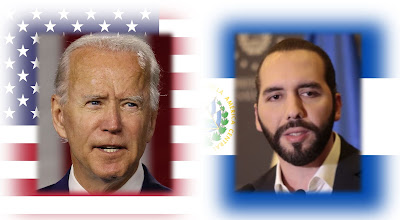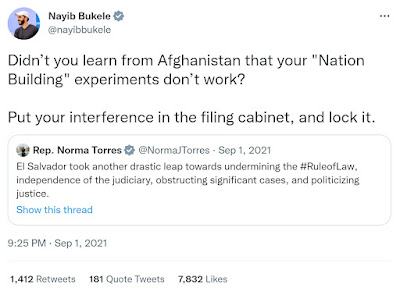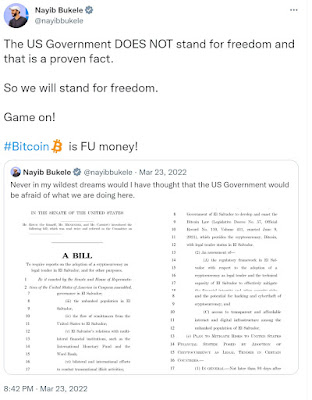US relations with El Salvador at the start of 2023
In 2023, a newly confirmed US ambassador will arrive in El Salvador in a challenging environment. On December 13, 2022, the US Senate confirmed William Duncan as the new ambassador to El Salvador. Duncan is a career foreign service officer with a long history in Latin America. He has not yet arrived in El Salvador to take up the post, but when Duncan gets here, he will encounter a relationship at one of its lowest points in decades.
For the first year and a half of his presidency, Nayib Bukele enjoyed a cozy relationship with the Trump administration then in office. Bukele famously stated after meeting with Trump on the sidelines of a UN meeting that Trump was ”nice and cool.” Bukele met several times with Homeland Security officials from the US and his government was seen as one of Trump's closest allies in Latin America.
With Trump, the relationship with the US rested on a basic proposition – in return for help on reducing the flow of migrants towards the US southern border, the US would continue financial assistance to El Salvador. The help from El Salvador took the form of such measures as deploying several hundred troops to the country’s borders to limit migrant smuggling rings, signing an asylum cooperation agreement to permit the US to send asylum seekers from other countries to El Salvador, and permitting the US to continue to deport Salvadorans throughout the pandemic despite the international airport in El Salvador being closed to any other kind of passenger flight.
Although early on Bukele faced significant international criticism over perceived authoritarian tendencies and abandonment of the rule of law, the Trump administration did not join in that criticism, except in the most muted way. Bukele enjoyed a close relationship with then US Ambassador Ronald Johnson, who steadfastly refused to criticize the Salvadoran leader for contravening the rule of law. Johnson’s joint appearances with Bukele were used by the Salvadoran president to support the position that his practices had Washington’s sanction.
All that changed with the election of Joe Biden.
The US policy towards El Salvador and the other Central
American countries has been labelled by the Biden administration as its “Root
Causes Strategy” The policy advances a US goal to reduce outwards migration from Central America by focusing on factors contributing to people choosing to leave their homes for the north. So the US seeks to address economic insecurity and inequality, corruption, democratic governance and the rule of law, gang violence and human trafficking, and gender-based violence.
It is the US focus on anti-corruption efforts, democratic governance and the rule of law which has irritated Bukele the most. The public face of these efforts has primarily taken the form of public rebukes of anti-democratic steps, and the imposition of visa and Treasury sanctions against public officials in the Bukele administration. The list of sanctioned officials includes:
- · The Chief of the president’s cabinet
- · The Minister of Labor
- · The head of the prison system
- · The president’s press secretary
- · The president’s legal secretary
- · All 5 judges of the Constitutional Chamber of the Supreme Judicial Court
- · The head of the Nuevas Ideas faction in the Legislative Assembly
- · Former ministers of Agriculture and Justice and Security
Perhaps most concerning from the standpoint of the US, none of these officials have been investigated, much less prosecuted, for corruption.
There are other factors straining the relationship between the Bukele regime and the Biden administration. One tension has been the ongoing failure of El Salvador to extradite MS-13 leaders to the US where they are indicted on terrorism charges.
In April 2022, US Secretary of State Andrew Blinken expressed concern over threats to press freedom in El Salvador under measures passed during the State of Exception.
In November 2022, the US State Department accused El Salvador of trying to interfere in the election of Rep. Norma Torres, a Democrat in California who has been a vocal critic of the Bukele administration.
In addition to the State Department, the US Congress has also been expressing concern over El Salvador. Congressional interest was summarized in an April 2022 Congressional Research Service briefing paper on El Salvador:
U.S. policy interest in El Salvador has broadened under the Biden Administration to focus on issues beyond migration control, and friction has grown due to U.S. concerns about democratic backsliding and corruption.
Many in Congress are monitoring events in El Salvador and U.S. policy responses. On May 19, 2021, the House Foreign Affairs Committee reported H.Res. 408, urging the Salvadoran government to respect the country’s democratic institutions. Congress prohibited Foreign Military Financing to El Salvador in the FY2022 Consolidated Appropriations Act (P.L. 117-103) and placed several restrictions on aid to the Salvadoran government. On April 4, 2022, the Senate Foreign Relations Committee reported S. 3666, a bill that would require the Secretary of State, in coordination with other agencies, to submit a report on the implications of the adoption of bitcoin as a form of legal tender in El Salvador. Similar legislation has been introduced in the House (H.R. 7391). Increasing concerns about corruption and authoritarianism in El Salvador among some Members of Congress could influence U.S. foreign assistance, sanctions, and trade policies. Congress also may monitor how tension in relations affects irregular migration, pending gang extraditions, and El Salvador’s ties to China.
Some of these Congressional doubts were expressed in the confirmation hearings of William Duncan as the new US ambassador to El Salvador.
For his part, Nayib Bukele has been defiant in responding to
the criticism coming from Washington.
Bukele repeatedly complains
about “interference” as in this tweet from 2021:
The Salvadoran president accuses the US and other western
nations of hypocrisy in holding El Salvador to a standard of human rights to
which they do not hold themselves.
Bukele refused last year to attend the US hosted Summit of the
Americas with leaders from the rest of the Americas and instead tweeted a
link to an opinion piece in the New York Post criticizing Biden “mismanagement” of
Latin American relations.
In his speech to
the UN General Assembly in September 2022 Bukele railed against big powers who
think they can meddle in a little independent country like El Salvador.
A good example of how Bukele pushes back from his preferred
social media platform of Twitter, came when a bipartisan group of US Senators introduced
legislation in February 2022 to have the US State Department report on risks of
El Salvador’s adoption of Bitcoin, citing risks of use by bad actors like China
and others seeking to avoid sanctions.
Bukele responded in a tweet:
Bukele’s public position and rhetoric of standing up to the
US and tweaking Uncle Sam’s nose comes straight out of the playbook for
populist leaders. The populist autocrat
portrays himself as the country’s hero standing up to powerful foreign
forces. He is the protector of the
interests of the people against meddling from abroad, appealing to national
pride embodied in the president himself.
For Bukele, there is little downside to this strategy. He has no concern over being scolded by the US, since that scolding has no real teeth beyond preventing sanctioned officials and their families from travelling to see family and go to tourist sites in the US.
The US, motivated more than anything by its desire to stem migration flows, has no apparent plan to cut off development resources. USAID described future aid efforts in the region on its website:
Centroamérica Local initiative, which USAID launched in November 2021 [is the means] through which the Agency will allocate $300 million over the next five years to foster locally led development solutions to irregular migration from El Salvador, Guatemala, and Honduras
The Congressional Research Service published this chart on past and future US dollars going to El Salvador:
- The US donated more than 3 million doses of Pfizer and Moderna vaccines to El Salvador.
- It donated 4 helicopters and other equipment to Salvadoran armed forces to support El Salvador’s participation in UN peacekeeping in Mali.
- El Salvador signed an agreement with FEMA for exchange of analysis and cooperation regarding disasters.
- Completion of a $15.5 million renovation of installations at a major border crossing into Guatemala to facilitate commerce.
[In the first 11 months of 2022, El Salvador exported approximately $2.7 million in goods to the US and imported roughly $4.7 million. Apparel and clothing make up almost two thirds of El Salvador’s exports to the US].
Thus despite the public criticism of democratic backsliding and public corruption within his administration, Bukele looks at the relationship with the US and sees direct aid continuing to flow as well as the US government encouraging people to invest in the small Central American country. This happens even while Bukele is publicly disparaging the role of the US in the world. So why would he change course?
In September 2021, I wrote a post titled The
Ineffectual US policy towards El Salvador, with the opening line "It is pretty obvious that the US does not know what to do about the president of El Salvador." In the 14 months since, little has changed.
So when Ambassador Duncan arrives in El Salvador this year, his goal is to support a growing, safe and prosperous El Salvador which will not push its people out towards the US seeking the Sueño Americano. Nayib Bukele is convinced that a growing, safe and prosperous El Salvador will happen without any need on his part to address the US denunciations of corruption and violations of democratic norms of separation of powers and the rule of law. And Bukele is happy to welcome the US aid which continues to flow and to take credit whenever a US company makes another investment in El Salvador.





Comments